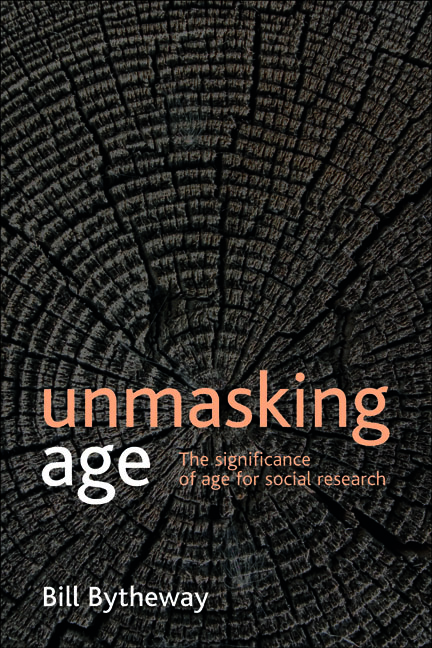Book contents
- Frontmatter
- Dedication
- Contents
- List of figures and tables
- Acknowledgements
- one Introducing age
- two Researching age
- three Age and time
- four Representations of age
- five Growing older in an ageing body
- six Being older
- seven A great age
- eight The ageing population
- nine Gerontologists and older people
- ten Getting real
- Postscript
- Notes
- Appendix
- References
- Index
four - Representations of age
Published online by Cambridge University Press: 07 September 2022
- Frontmatter
- Dedication
- Contents
- List of figures and tables
- Acknowledgements
- one Introducing age
- two Researching age
- three Age and time
- four Representations of age
- five Growing older in an ageing body
- six Being older
- seven A great age
- eight The ageing population
- nine Gerontologists and older people
- ten Getting real
- Postscript
- Notes
- Appendix
- References
- Index
Summary
The history of gerontology may accurately be described as the history of the social construction of meaningful images or metaphors of old age. (Hepworth, 2004, p 11)
While engaging with people in interviews or other participative activities is essential to gerontological research, this in itself is not sufficient. The analysis of language and image and how they are used to represent age in the wider cultural landscape, is just as important. So the issues I address in this chapter relate to roadside billboards, government documents and statistical samples – any attempt, in fact, to ‘represent’ age.
Representation is a word with many associations (Hall, 1997). I use it here to cover the ways in which words, pictures and diagrams might be used in attempts to convey the realities of age, not only about what age is, but also about how it could be different. These attempts are often described as ‘models’: what it is to grow older is represented by a model. Essentially, as Mike Hepworth implies in the quote above, such models are metaphors. Each representation produces an image not of age itself but of ‘what age is like’.
Words and images underpin models of age. In particular, they create structured understandings of the characteristics of older people: what they might need, how they might behave, where they might live, and how ‘we’ should relate to ‘them’. The idea of ‘model’ is helpful insofar as it implies mechanisms that explain how circumstances change and people age. A model might be devised, for example, to represent the ageing process. But it is important to appreciate that at best a model represents ‘a truth’, not the whole truth about age.
Words
From his study of the history of gerontology, Stephen Katz concluded that ‘gerontological texts linguistically shaped old age’ (1996, p 79). He referred in particular to terms such as ‘senile’; to the organisation of textbook chapters and the use of scientific rhetoric; to the production of inventories and cataloguing charts; and to the endorsement of how gerontology might parallel other, more established, areas of research such as paediatrics. What he argues is that textbooks have not only disseminated knowledge, they have also influenced the ways we think.
- Type
- Chapter
- Information
- Unmasking AgeThe Significance of Age for Social Research, pp. 75 - 90Publisher: Bristol University PressPrint publication year: 2011



